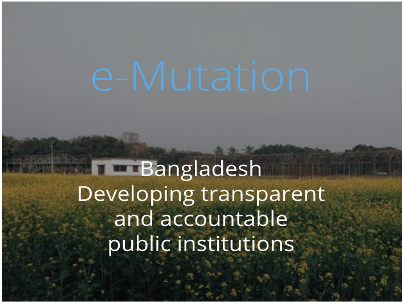Initiative: e-Mutation
Institution: Ministry of Land, Bangladesh
Problem: Bangladesh, one of the most densely populated countries in the world, has a both a land scarcity problem and a complex property transfer system. The mutation of land (the method of changing the title of ownership from one person to another when the property is inherited, transferred or sold) has long been a lengthy, expensive and complex process rife with corruption and a lack of transparency which affected the rights of women, the poor and the vulnerable to access land. The manual mutation process often took up to 60 days, requiring 3 to 4 in person meetings and could often include the added expense of ‘middlemen’ who helped with application submission.
Solution: The e-Mutation initiative established a digital mechanism for mutation applications, which allowed for more efficient application, tracking of the process, and delivery of timely services. It aims to ensure transparency and accountability in the process, increase efficiency, and ensure a system that is fair to all citizens, particularly the most vulnerable including the illiterate, women, older persons and the poor. The initiative also recently developed a hotline service for land-related issues and grievances. The e-Mutation service has helped increase the credibility and trustworthiness of the public administration in charge of land services.
Impact: The time for land and property mutation was reduced from 60 to 28 days with only one visit (instead of 3 or 4 prior to the initiative). According to reports provided, it served 1.5 million beneficiaries, especially women and people with disabilities.
File added date: February 2021
URL: https://publicadministration.un.org/unpsa/database/Winners/2020-winners/e-mutation
 Добро пожаловать в ООН!
Добро пожаловать в ООН!
